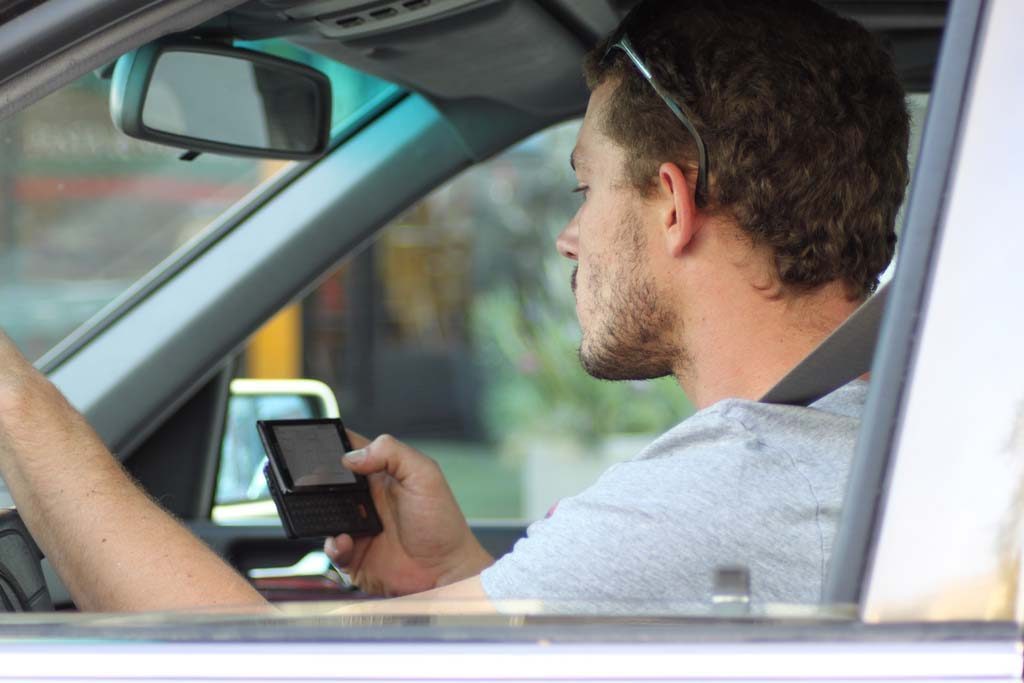
In a bid to reduce fatalities and incidents of distracted driving in Qatar, a locally-based company has launched several apps that voluntarily lock a motorist’s mobile phone while a vehicle is moving.
Taking notice of the Salamtek initiative, developed by Qatar Mobility Innovations Center (QMIC), one of the country’s largest insurance providers is considering using the new technology to reward safe drivers here with lower premiums.
Road accidents are a leading cause of death in Qatar, and the country’s top traffic police officer has said that the majority of serious collisions occur when the driver is using a mobile phone.

Brig. Mohammed Saad Al-Kharji, the director-general of Qatar’s traffic department, told Doha News on the sidelines of today’s app launch that investigators who are probing major accidents routinely reach out to telecom providers Ooredoo and Vodafone to find out if the driver’s mobile phone was being used at the time of the crash.
“(In the case of) more than 80 percent of the accidents, they are using their mobile,” Al-Kharji said.
QMIC officials emphasized that while there is no single solution that will motivate or force drivers to stop using cell phones while driving, they are confident Salamtek will make Qatar’s roads safer.
“This is a complicated problem,” said QMIC chairperson Abdulla Al-Talib. “There is no way that anyone can come up with a complete solution for it. We are trying our best. Saving one life is worth the efforts we are putting forward.”
Salamtek
QMIC, which is headquartered in the Qatar Science and Technology Park, began looking at ways of tackling distracted driving roughly two years ago, launching its first mobile app in June 2013.

It has since developed a portfolio of apps and services as part of its Salamtek Initiative, which involves software that locks a cell phone when a vehicle is moving above a certain speed, logging missed calls and messages and sending automatic replies to those calling a Salamtek-locked phone.
A “beacon” can be installed on the driver’s side of the vehicle and detect whether the phone is in close proximity and being used by the operator or has been passed to a passenger and can be used safely.
While a basic “personal” version can be downloaded for free to Android devices from the Google Play store, QMIC also markets enterprise and family versions of its software that allow users to remotely monitor the mobile phone use of their children or employees while they are driving.
QMIC plans to release all three versions for iPhones in the coming months.
Today’s event was intended to unveil the “Salamtek Consortium,” which is a group of organizations that includes QMIC, the Ministry of Interior’s traffic department and others that are working together to tackle distracted driving in Qatar.
The consortium also includes the Qatar Insurance Co., which can give motorists a financial incentive to use of QMIC’s technology and profit from safer drivers.
Black box
P.E. Alexander, the CEO of Qatar Insurance, said that when his firm learned of QMIC’s work, “we thought we must definitely be a part of it.”
“We have an ulterior motive as an insurer. If we can see the number of accidents reduced, it improves our bottom line. There is also the corporate social responsibility, (resulting in) less people getting injured, less property damage.”
The insurer, which covers between 150,000 and 200,000 local drivers, recently completed a pilot project with QMIC on a more advanced piece of technology.

For three and a half months this year, some 40 motorists voluntarily offered to equip their vehicles with sensors that tracked how quickly they accelerated, decelerated, took corners and how fast they drove.
That data was transmitted back to QMIC, which analyzed it and produced a score rating their driving for the insurance company. To address privacy concerns, all the information about the vehicle’s location and movements stayed with QMIC. Only the final score was shared with the insurance company.
At the end of the pilot project, the safest driver received a trip to Dubai as a prize. When applied on a wider scale, however, the prize would be lower insurance premiums for safe drivers, as opposed to those who exhibit reckless behavior behind the wheel.
“The idea is that the safer you drive, the more you reduce your bill. We’re looking at that,” Omar Bondogji, QMIC’s head of marketing and business development, told Doha News.
He said he’s also hoping that QMIC’s fellow consortium members would also eventually offer discounts, prizes or other incentives for users of its Salamtek apps to encourage its use.
More enforcement

In the meantime, the Ministry of Interior said it also plans to boost its enforcement efforts of laws prohibiting the use of mobile phones while driving and other regulations.
The traffic department’s Al-Kharji said many new officers would be completing their training in the coming weeks and would soon be patrolling Qatar’s roads and highways, as well as be stationed on foot at certain intersections.
When asked, he was unable to say how many new officers are being added to the department’s ranks, but said they would have a visible presence.
“You will see it,” Al-Kharji said. “We have to reduce the (number of) accidents.”
Thoughts?







